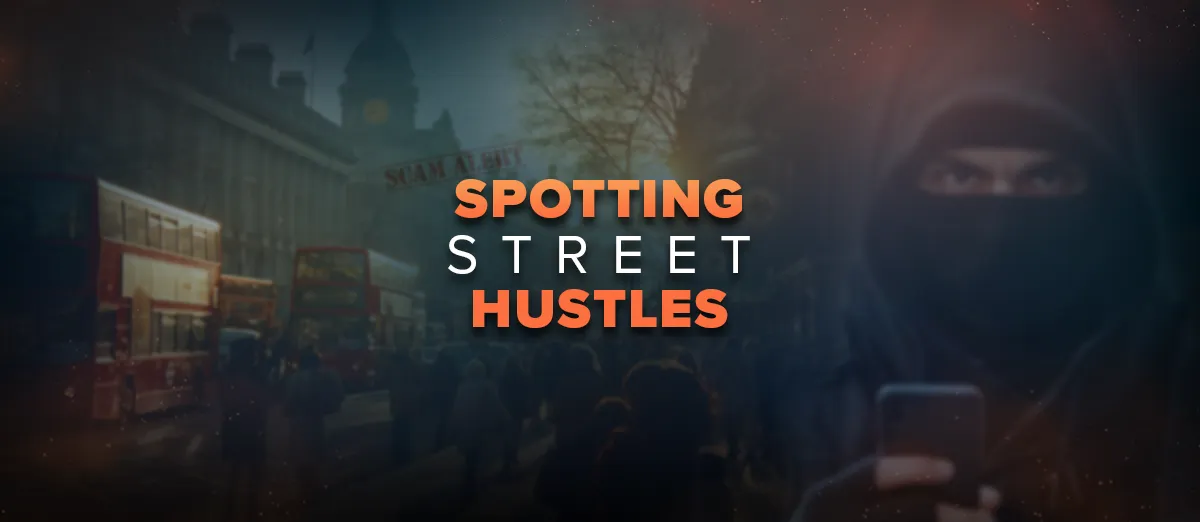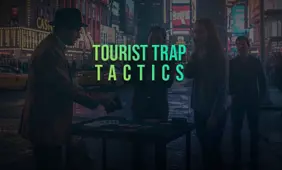R. Paul Wilson On: Avoiding Popular Street Scams

Some con games are as old as the hills, yet many people around the world are still fooled by them because they haven't taken the time to research the scams targeting travelers in specific destinations. One street hustle that I've seen all over Europe is a perfect example of this. Despite being almost ubiquitous, it continues to snare new victims with ease, constantly evolving to become even more effective.
As I write this, I'm currently traveling in Spain and spending a few days in Madrid, one of my favorite cities. As well as it’s cultural qualities, Madrid is also (like all big cities) an excellent source of information about how hustlers and scammers operate and I spend many days and long hours trawling the streets, metro and busy locations to watch thieves in action. Here, I witnessed the ingenious umbrella pinch used by an expert pickpocket, seen how teams trap people in the metro to lighten their bags without arising suspicion and followed a three-shell game for several days to learn exactly how they operate.
A Simple Yet Effective Scam in the Streets of Europe
The street hustlers’ natural target is, of course, tourists because all of us are vulnerable when outside our own domain, but many (perhaps all) successful scams rely on principles that relate to other aspects of our lives. This means we can sometimes learn from rough hustles played in far flung countries to better defend ourselves at home.
What's surprised me on this trip is that one of the oldest and most common scams found here—and all over the continent—has changed and developed an interesting and extremely effective new twist. On the streets of Madrid, scammers have developed a simple strategy to trap victims in the rosemary scam.
This is a variation on an old con game where people are offered apparently free gifts such as a cheap bracelet, a small book or - in Madrid - a sprig of fresh rosemary (the herb). These hustlers convince people to take these ‘gifts’ but, as soon as they do, press the receiver to pay a small donation, which quickly ramps up to a larger sum once they go for their money.
Although, you might think you could avoid most casino scams or this plot, the physical offer of anything is often met with an automatic response to take it before even thinking about it. Suddenly, you're caught up in an engineered situation where you are at a distinct disadvantage. You might think you could simply throw down the rosemary and walk away, but this scam works because the scammers are extremely persistent, becoming threatening and potentially violent if you don't comply by giving them money.
I've seen the same scam pulled in London by large groups of women who gather and gang up on anybody who refuses to pay, transforming from polite, kindly ladies into a crowd of harpies surrounding, berating, and bullying people into handing over cash. Their free gift is a sprig of heather, traditionally thought to be lucky but exactly the opposite if you are unlucky enough to take one.
The Peacemaker Con - Recognizing the New Face of Street Hustles
What spurred me to share this article was that the Madrid variation has added a powerful new twist that you may find in all sorts of situations and is cleverly constructed to put you on your back foot, forcing you into a corner with only one way out: the peacemaker.
Being much more different than gift card or jam auction scams we usually speak about, I will explain this scam in detail. The peacemaker would be a seasoned hustler who (I’m guessing) speaks several languages wearing a suit or smart clothes to both set him apart from his confederates and to give them instant respectability. This person would be signaled as soon as their fellow scammers entrap a target then step in to apparently resolve the situation.
I watched this happen several times over the last weekend, with the same person (always dressed differently from these grimy gift-givers,) stepping in to help tourists who were refusing to hand over money even when being bullied to do so. Although I wasn't close enough to hear the entire conversation, I could tell that the peacemaker spoke enough English to manipulate these victims into believing that their best escape route was to hand over some cash and get out of there without being pursued.
What impressed me most was how quickly and easily a seemingly calm and helpful presence both diffused the situation and manipulated the mark into doing exactly what they were trying very hard to avoid. Think of it this way: someone tries to get you to hand over €20. You refuse, only to find yourself in an escalating situation causing stress while stimulating your automatic defenses.
In this type of scenario, the €20 becomes unimportant very quickly as primal instincts take over to protect you from more immediate, perhaps physical dangers. Without realizing it, you find yourself entering fight-or-flight mode in unfamiliar territory, where language itself is both a barrier and a threat. All it takes once this scenario is ignited is for someone—anyone—to step in and offer to help.
A variation on this ‘peacemaker ploy’ is well illustrated in the film “Red Sun” where the manipulative older character played by Sean Connery encourages his younger partner, Wesley Snipes to engage in a negotiation until it escapes into a potentially violent argument whereby the older man steps in and offers to help. This was presented as simply playing a necessary game where Connery’s character commanded respect and forced their counterpart into a precarious disadvantage. Perhaps this is a ploy I've never noticed before on the street, but I was able to watch it play out several times and see how easily each confrontation ended in exactly the same way.
The easiest way to avoid street scams like this is to know about it. Once caught up in this type of scenario, it can be very difficult to escape unless you are willing to escalate the situation and become threatening in response to being threatened. I can't guarantee that this will always work or that the hustlers will back down, but I can say that whenever someone tries to hand me something unexpectedly, I have developed a harsh response to being offered anything by these gangs, which is far from pleasant if you are on the receiving end. Most importantly, I never break stride and keep walking, ignoring any threats and insults that might follow.
Con Games in Everyday Life
While you may not be planning a trip to Madrid this summer, you might still find yourself targeted by manipulative forces where the person you feel inclined to trust might not be working towards your best interests and while I don't want to encourage paranoia, awareness can be the ultimate protection if you learn to respond in a way that benefits your best interests.
As with all con games (or questionable business strategies), we can learn to identify deceptive principles in all walks of life and recognize where parties collude to create opportunities where one side is being influenced thanks to a third party who is apparently offering help. This is not an uncommon tactic and is closely related to how all such peacemakers manipulate people within engineered or predictable scenarios.
Next we’ll explore how this exact scam might be applied to situations where victims lose many thousands from their online bank instead of just a few euros on the street.





Review this Blog
Leave a Comment
User Comments
comments for R. Paul Wilson On: Avoiding Popular Street Scams